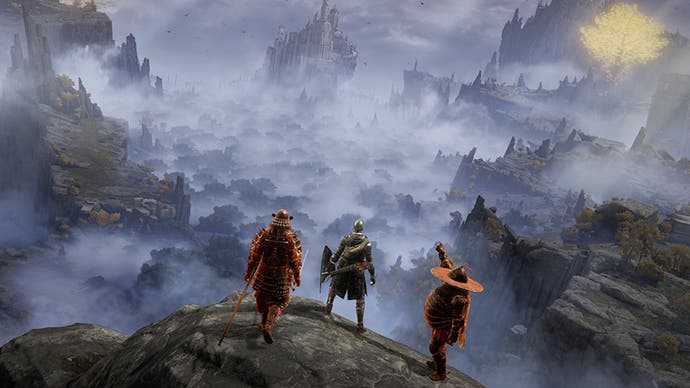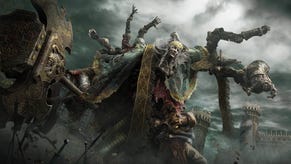To me, depression and games have always been tied together
"Simply being able to enjoy something becomes a rare and important treasure."
Hello! Our ongoing series of articles examining accessibility in games continues with this piece from Caelyn.
This piece discusses depression.
Anyone who has a large collection of games, whether it's in the form of shelves of physical media, a Steam library bloated by years of sales and bundles, or a subscription service like Xbox Game Pass, has probably experienced a form of choice paralysis at some point. You've got some time on your hands, you want to play a game, you have dozens or even hundreds to choose from, but none of them tickle your fancy. Maybe you'll sort of decide on one, fire it up for a few minutes, but quickly find that it isn't holding your interest. Between the faffing around and the constant distraction provided by the internet and smartphones, your free time is gone before you know it.
Now imagine that was your default state and it didn't just apply to games, but to all areas of your life. Pretty grim, right? That's the best way I can describe living with depression.
Depression is a common mental illness. About five percent of the population worldwide have depression at any one time, and an estimated 20-30 percent of people will experience it at some point during their lives. The symptoms are varied and include irritability, feelings of emptiness, uselessness and hopelessness, and can affect sleep, appetite and energy levels. As with most mental health conditions, many people don't even think of depression as a disability. This, combined with widely available treatment being effective for most cases, means that more severe depression is often not taken seriously, even by people who have personally experienced it.
The most common misconception about depression is that it's simply being sad. While feelings of sadness are a symptom of depression, they're often not present at all, which was the case when I was first diagnosed, around fifteen years ago. I'd been feeling run down for some time, and while I just assumed it was the lingering effects of a bad cold, I thought it was worth mentioning while I was at an appointment with my GP for an unrelated matter.
The first question he asked was if I'd had trouble concentrating on or getting pleasure from activities that I usually enjoyed. Immediately I thought of video games! I had indeed been struggling to focus on our most pleasurable pastime for quite some time. My symptoms were the result of textbook depression and it was my struggle to have fun with video games that was the clincher.
It's a condition I've lived with ever since. There have been some bad, bad times, but these days things are much more manageable and I'm on the long, slow road to recovery.
Depression might seem like an odd thing to be writing about for a video game website, even for a series looking at accessibility, but when Christian asked me if I was interested in doing something on the subject, inspired by last year's Disability History Month, it was the first thing that sprang to mind. To me, depression and games have always been tied together, for good or for ill.
I've already talked about how an inability to enjoy games has been an obvious symptom of the illness, but games have also provided a refuge and an outlet during hard times. RPGs of various flavours have always been my preferred poison, so it's no surprise that most of the games that have helped puncture the horrible brain fog that I experience fall along those lines.
Top of this list has to be Skyrim. (Haha, stealth Skyrim article! Booyah!) It may not be the trendiest thing to talk about how much you love The Elder Scrolls: The Fifth One and everything I say about it applies to pretty much every other Bethesda RPG since Morrowind. Whether it's just good timing or some secret ingredient, Skyrim is the one that gets the (dragon) shout out. It strikes a balance between an open world that I can approach on my own terms and easily digestible narrative nuggets. More story-focussed games just don't hold the same appeal. I love a Dragon Age or a Mass Effect the first time around, but when I think of replaying them, I get put off by the thought of all the bits I don't like and having to do them again. Fully sandbox titles swing too far the other way, with the lack of focus feeling a little overwhelming. Skyrim is a familiar RPG smorgasbord. I can do what I want to do, in whatever order I want to do it. At the same time, the overarching narrative that I'm building for my character holds my interest long term.
Mods are just the icing on the proverbial sweetroll. Being able to tune the whole experience to exactly what I'm craving is hugely important. Ever get the feeling where you just want to play something very specific and only that thing will suffice? Imagine that turned up to eleven. The amazing work done by the mod community means that, between Skyrim and Fallout 4, it's quite likely that I can scratch whatever itch is bothering me.
Next up is Dark Souls. Again, this applies to many SoulsBorneVaniaLikes, but Dark Souls makes for useful shorthand. It may seem a bit weird to think about Dark Souls as a comfort game. My first time through any of these games is as tense and teeth-clenching as it is for most folks, but after I have the basics down, they provide me with a certain meditative calm. Like Skyrim, the character customisation, build variety and branching pathways allow me to feel like I'm engaging with the game on my terms. I love the rhythm of the combat and exploration, so it always feels like time well spent. Most importantly, the harsh-but-fair difficulty of the series means that progress gives an immediate sense of achievement, something that I've found hard to come by. So much of dealing with a mental health condition involves slowly struggling to reach what most people would consider normal. "Hey, I got up before midday, put on some actual clothes and made a cup of coffee" isn't going to sound like a lot to anyone who doesn't understand your circumstances and you don't always want to go into the details of your problems with everyone you speak to. "Hey, I finally made it through Blight Town" is a much easier triumph to share.
Most recently, I've absolutely fallen for deck-builders, particularly Slay the Spire and Monster Train. Unlike most of the games that have been great depression times attention holders, there's no particularly strong narrative focus here. Instead there's a heady mix of short term tactics, long term strategizing and that wonderful "just one more turn" factor. What really works for me is how the very finite length of runs maintains my interest over a long time. I'm the sort of person who will be really captivated by something like a 4X for a few days, then drift away and never play it again. With even wildly successful runs being brought to a relatively swift conclusion, these games let you go out on a high before anything gets stale.
I realise that I run the risk of this piece reading like a short list of games I really like. To some extent, that's a fair assessment. However, when you're struggling to find any real pleasure in life, simply being able to enjoy something becomes a rare and important treasure. Video games can help people living with disabilities in many ways. For me, they've provided a much needed escape, and a sense of accomplishment when my life felt empty. They've also helped me identify and learn how to deal with specific aspects of my condition, which has greatly aided my recovery.
Sometimes just being able to enjoy a game for an afternoon can mean everything.
If you feel like you need someone to talk to, the Samaritans are there to help. They can be called, for free, on 116 123 in the UK and Ireland, or emailed on jo@samaritans.org/ie. Lines are open 24 hours a day, 365 days a year.
In the US, the National Suicide Prevention Lifeline is 1-800-273-8255. In Australia, the crisis support service Lifeline is 13 11 14. Other international suicide helplines can be found at www.befrienders.org.



















